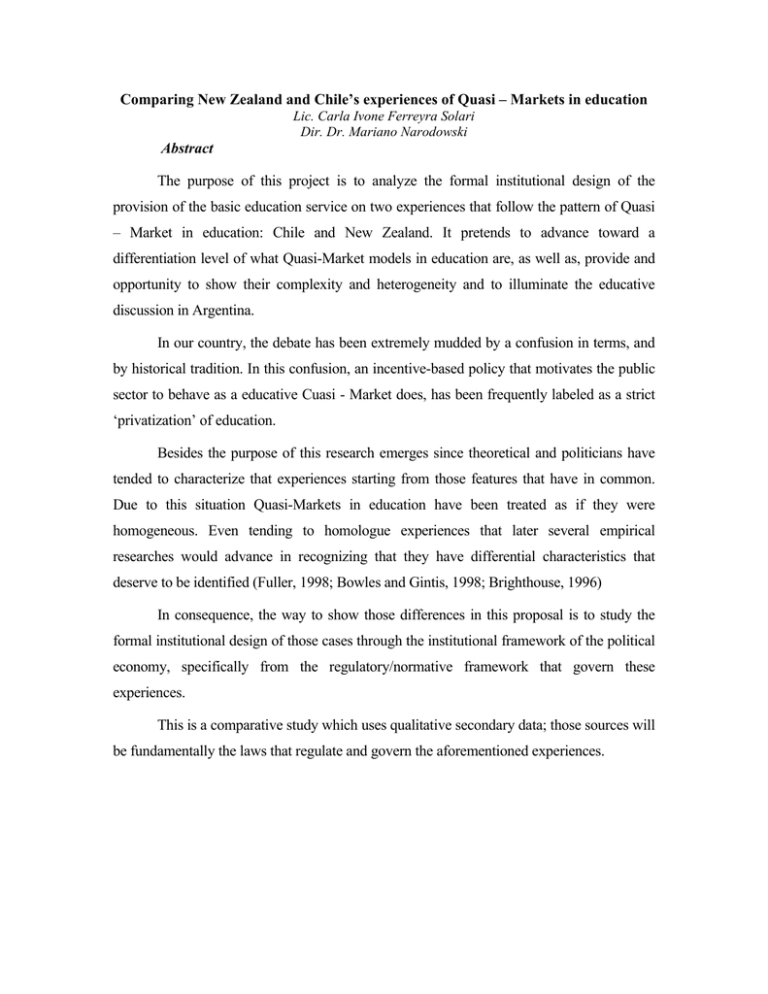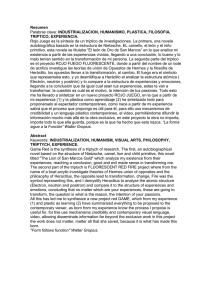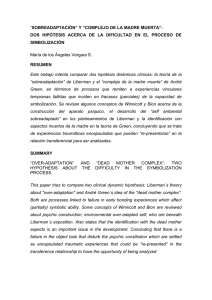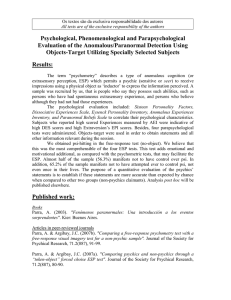Abstract
Anuncio

Comparing New Zealand and Chile’s experiences of Quasi – Markets in education Lic. Carla Ivone Ferreyra Solari Dir. Dr. Mariano Narodowski Abstract The purpose of this project is to analyze the formal institutional design of the provision of the basic education service on two experiences that follow the pattern of Quasi – Market in education: Chile and New Zealand. It pretends to advance toward a differentiation level of what Quasi-Market models in education are, as well as, provide and opportunity to show their complexity and heterogeneity and to illuminate the educative discussion in Argentina. In our country, the debate has been extremely mudded by a confusion in terms, and by historical tradition. In this confusion, an incentive-based policy that motivates the public sector to behave as a educative Cuasi - Market does, has been frequently labeled as a strict ‘privatization’ of education. Besides the purpose of this research emerges since theoretical and politicians have tended to characterize that experiences starting from those features that have in common. Due to this situation Quasi-Markets in education have been treated as if they were homogeneous. Even tending to homologue experiences that later several empirical researches would advance in recognizing that they have differential characteristics that deserve to be identified (Fuller, 1998; Bowles and Gintis, 1998; Brighthouse, 1996) In consequence, the way to show those differences in this proposal is to study the formal institutional design of those cases through the institutional framework of the political economy, specifically from the regulatory/normative framework that govern these experiences. This is a comparative study which uses qualitative secondary data; those sources will be fundamentally the laws that regulate and govern the aforementioned experiences. Análisis comparativo de dos experiencias de Cuasi – Mercado: el sistema escolar de Nueva Zelanda y Chile Lic. Carla Ivone Ferreyra Solari Dir. Dr. Mariano Narodowski Resumen El objetivo de esta tesis es analizar el diseño institucional formal de la provisión del servicio de la educación básica en dos experiencias que siguen el modelo de CuasiMercado: Chile y Nueva Zelanda. Se trata de avanzar hacia un nivel de diferenciación de lo que son los modelos de Cuasi-mercado educativo y mostrar su heterogeneidad ya que, teóricos y políticos han tendido a caracterizarlos a partir de aquellos rasgos que tienen en común. Esto ha dado lugar a caracterizar a los Cuasi- Mercados educativos como si existiese un modelo único y homogéneo. Incluso se ha llegado a homologar experiencias que posteriormente y, a partir, de varios estudios de casos se avanzaría en reconocer que tienen características diferenciales que merecen ser identificadas. Dicho lo cual, una forma de diferenciar estas experiencias es estudiar los diseños institucionales formales de aquellos casos que se denominan genéricamente Cuasi-mercados educativos desde el enfoque institucional de la economía política y a partir de las normativas que rigen estas experiencias. Se trata de un estudio de naturaleza descriptiva en el que se hace uso de datos secundarios cualitativos cuyas fuentes serán fundamentalmente las leyes educativas que rigen las experiencias mencionadas.






